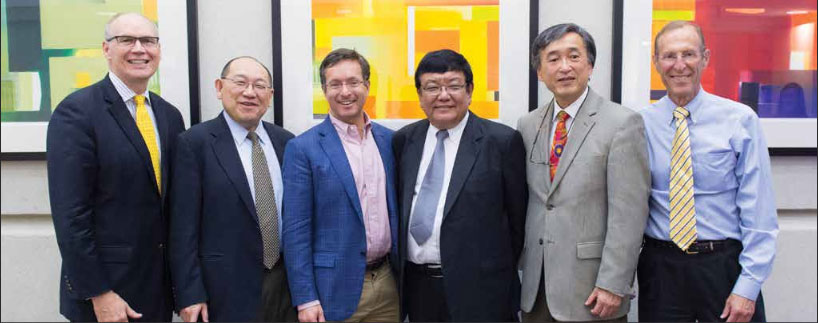
Sanduk Ruit, M.D., a Nepalese ophthalmologist who is widely recognized as having done more than any other single individual to reverse cataract blindness throughout the developing world, was the keynote speaker at the second annual International Night sponsored by the Kellogg Center for International Ophthalmology. The event, which took place on September 22, 2014, drew 225 people to the Eye Center, including over 100 U-M medical students.
Dr. Ruit, who was named the Center’s second Scholar-in-Residence, has performed over 100,000 cataract surgeries and is best known for “manual small-incision cataract surgery,” a procedure he completes within five minutes and achieves visual results comparable to those of surgeons using expensive equipment not available in resource-poor areas. Dr. Ruit urged his enthusiastic audience to “be passionate and not to give up when obstacles are in your way.”
In the audience that night was Alexandra Roos, a senior undergraduate student at U-M, and president of the U-M chapter of the American Student Medical Association. “Dr. Ruit sees an issue, and he takes action. He doesn't think about the time it will take to reach his goal of ending preventable blindness,” she said after the presentation. “He helps others because they need more than he does. Politics do not deter those who truly believe in medicine’s goal to provide the best possible care. That is what I find so inspirational. Wherever I go in life, and however I get there, I just hope that I too can be a little more selfless every day. I want to be bold when it requires it, and to not be silenced by those who tell me I can't or I shouldn't.”
Earlier in the day, over 60 U-M undergraduates listened to Dr. Ruit at a brown bag luncheon. Among them was Clint Mondi, Class of 2015, who explained, “When I heard that Dr. Ruit had enabled 100,000 patients to recover from cataract blindness, the truth of that statistic never really registered in my mind. But when, in a video he showed us, we saw the eye patches come off of a woman after cataract surgery, and the brightest smile in the world came on her face, we realized what 100,000 meant — the ability to see your own child for the first time, to see your friends and family, to see your village! To be able to make such a huge impact on a stranger's life through quick surgery is beautiful. His talk has given the pre-medical students at Michigan a desire to make a positive impact wherever we go.”
Dr. Ruit was accompanied on his visit by Geoffrey Tabin, M.D., professor of ophthalmology at the University of Utah, and co-founder with Dr. Ruit of the Himalayan Cataract Project, which aims to reduce blindness in underserved parts of Asia and Africa by establishing ophthalmic surgical centers and training ophthalmic personnel at all levels.
The evening began with a buffet dinner and posters displaying the overseas activities of U-M students and faculty. Joseph Kolars, M.D., U-M professor of internal medicine and director of the U-M Medical School’s international program called Global REACH, explained the school’s efforts to develop sustained research and clinical collaborations with medical institutions abroad. Taylor Moberg, U-M senior undergraduate, said that she performed just about any job needed during her visit to an ophthalmic clinic in India under the auspices of Unite for Sight. Steven Weinberg, third-year medical student, described his work at a clinic in Ethiopia. Erica Rose, a dual degree graduate student at the Ross School of Business and the U-M School of Public Health, reported on her project to analyze the fiscal aspects of running satellite eye care centers of the Aravind Eye Care System in India. Kellogg assistant professor of ophthalmology Jonathan Greene, M.D., delivered a progress report on Kellogg’s project to develop an ophthalmology residency program in Ethiopia.
